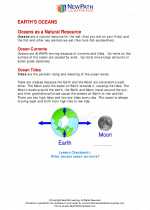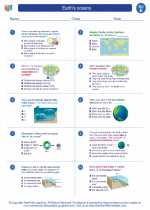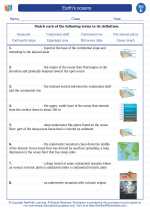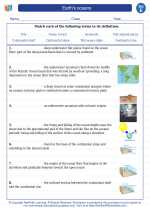Geology: The Study of the Earth's Structure and Processes
Geology is the scientific study of the Earth, its composition, structure, processes, and history. It encompasses a wide range of topics including the formation of rocks, the movement of tectonic plates, the effects of erosion, and the history of life on Earth.
Key Concepts in Geology
1. Rock Types
Rocks are classified into three main types: igneous, sedimentary, and metamorphic. Igneous rocks form from the solidification of molten magma, sedimentary rocks are formed from the accumulation and compression of sediments, and metamorphic rocks are formed from the alteration of existing rocks due to heat and pressure.
2. Plate Tectonics
The theory of plate tectonics explains the movement of the Earth's lithosphere (the outermost layer of the Earth) on the underlying semi-fluid asthenosphere. This movement causes earthquakes, volcanic activity, and the formation of mountains and ocean basins.
3. Earth's History
Geologists study the Earth's history through the analysis of rocks and fossils. They use principles of stratigraphy, radiometric dating, and fossil evidence to understand the sequence of events that have shaped the Earth over millions of years.
4. Geologic Time Scale
The geologic time scale is a system of chronological dating that relates geological strata to time. It is divided into eons, eras, periods, epochs, and ages, and provides a framework for understanding the vast expanse of Earth's history.
Study Tips for Geology
- Review the characteristics and formation processes of igneous, sedimentary, and metamorphic rocks.
- Understand the principles of plate tectonics and how they relate to the Earth's surface features.
- Practice using the geologic time scale to assign relative and absolute ages to rock layers and events in Earth's history.
- Explore the role of geology in understanding natural hazards such as earthquakes, tsunamis, and volcanic eruptions.
- Visit geological sites or museums to see real-life examples of rock formations and geological processes.
Conclusion
Geology is a fascinating field that helps us understand the dynamic nature of the Earth and its long history. By studying geology, we can gain insights into the processes that have shaped our planet and continue to influence its environment.
.◂Science Worksheets and Study Guides Fifth Grade. Earth's oceans

 Worksheet/Answer key
Worksheet/Answer key
 Worksheet/Answer key
Worksheet/Answer key
 Worksheet/Answer key
Worksheet/Answer key
 Vocabulary/Answer key
Vocabulary/Answer key
 Vocabulary/Answer key
Vocabulary/Answer key
